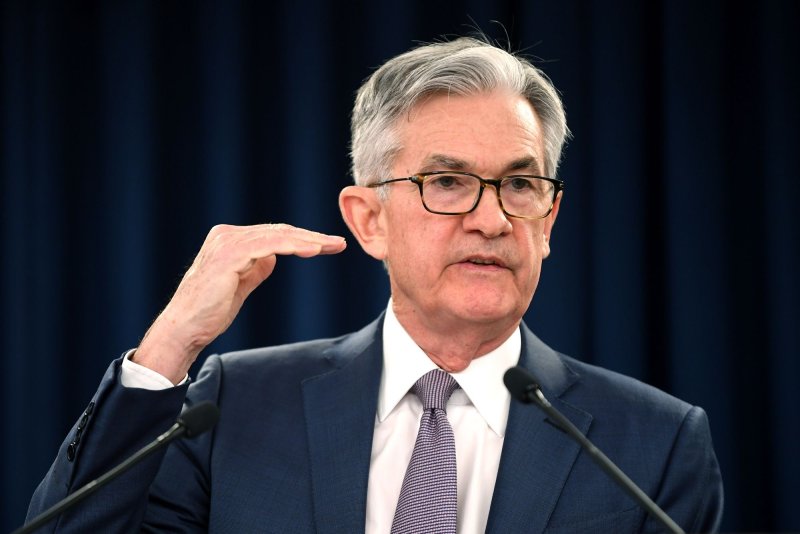Federal Reserve Chairman Jerome Powell said he believes the U.S. economy may not recover from the effects of COVID-19 until at least early 2021 depending on the development of a vaccine and a possible resurgence. File Photo by Kevin Dietsch/UPI |
License Photo
May 17 (UPI) -- Federal Reserve Chairman Jerome Powell cautioned that it may take more than a year for the U.S. economy to recover from the impacts of the COVID-19 pandemic.
In an excerpt of an interview with 60 Minutes set to air on Sunday evening, Powell said the path to economic recovery is unpredictable but he believes that it could begin in the early part of 2021.
"This is a time of great suffering and difficulty. And it's come on us so quickly and with such force, that you really can't put into words the pain people are feeling and the uncertainty they're realizing. And it's going to take a while for us to get back," said Powell. "But I would just say this. In the long run and even in the medium run you wouldn't want to bet against the American economy."
Powell added he ultimately believes economic recovery will be dependent on how confident the American people are that they are protected from the threat of COVID-19.
"Assuming there's not a second wave of the coronavirus, I think you'll see the economy recover steadily through the second half of this year," he said. "So, for the economy to fully recover, people will have to be fully confident. And that may have to await the arrival of a vaccine."
Powell's comments come after Powell called for more financial support from Congress to recover from the crisis during a webcast with the Peterson Institute for International Economics.
On Tuesday, Powell is set to testify before Congress alongside Treasury Secretary Steven Mnuchin, where he is expected to again call for increased spending amid the crisis.
The Dow Jones Industrial Average fell 516 points on Tuesday following Powell's remarks, and the Dow and the S&P 500 lost 2.4 percent on the week to end with their worst week since late March.
Many states throughout the country have taken steps to reopen, with South Carolina set to allow close-contact services including barbershops, hair salons, athletic facilities and tattoo and massage parlors to re-open on Monday.
Louisiana reopened restaurants, theaters and casinos on Friday, while the Wisconsin Supreme Court overturned the state's stay-at-home order lifting all restrictions on Wednesday, shortly after Gov. Tony Evers allowed nearly all retailers to reopen.
Late Friday, the House passed a $3 trillion coronavirus relief bill known as the HEROES Act, which aims to provide money to state and local governments and increase funding to the U.S. Postal Service.
The bill, however, is unlikely to advance beyond the chamber as Sen. Lindsey Graham, R-S.C., has called it "dead on arrival" in the Senate and President Donald Trump has promised he will veto it.















